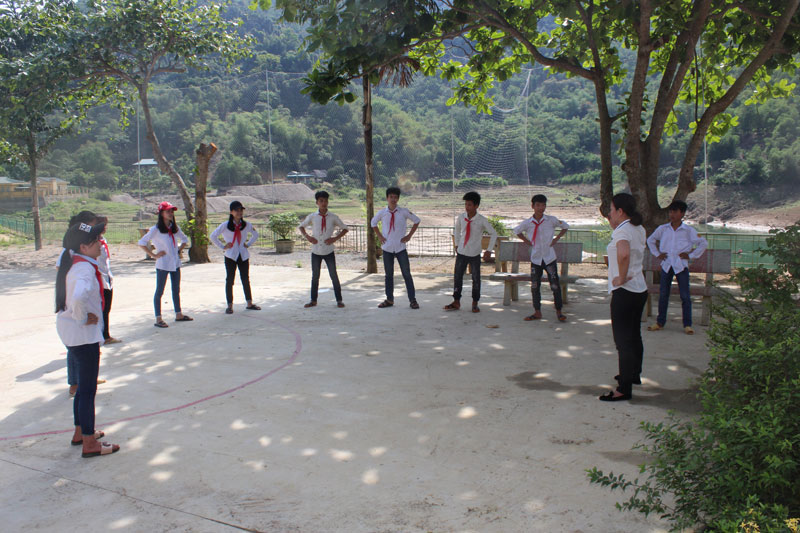
(HBO) – By life skills education, students have been given a chance to strengthen the capacity and quality, and promote positive, active and creative characteristics. These students feel self-confident and brave in all activities. Moreover, life skills education also has positive meaning in which it helps students consolidate the knowledge learned in the class. As a result, these students are equipped with life skills, collaborative communication and self-awareness. Additionally, they can learn how to express empathy and cultural behavior as well as make decision and solve problems. Finally, students are able to enhance their creative thinking, emotional management and face challenges. The outstanding result of life skill education is that students could gain the knowledge to use in practice and take care of themselves and their families.

Students in Hien Luong Secondary School (Da
Bac district) are equipped and instructed swimming safety skills and drowning
prevention.
According to the statistics of Department of
Education and Training, there are 43 schools in Da Bac district (including 20
kindergartens, 12 primary schools, 11 secondary schools and 10 high schools).
By the end of 2017 to 2018 school year, 100 percentages of the schools have
provided life skill education for students with the participation of 1368
teachers. Life skills education was organized by the schools through these
activities which were integrated in daily lessons, extracurricular classes,
creative experiences and talent clubs. At the moment, all of schools have
established many clubs such as elementary mathematics clubs, elementary
literatures clubs, English clubs, music clubs, chess clubs and football clubs.
Especially, the work of life skills education
has been inspired beautifully and attractively by these extracurricular classes
with practical and informative topics such as accident and injury prevention,
traffic safety, environmental protection and self-defense skills. Also, they
popularize life skills education and health protection.
In order to improve the quality of life
skills education, the schools have strengthened coordination with the local
authority, the families and other organizations to inform the development of
students, consult further about how to train and educate children. For example,
they could give students chances to visit the historical sites and support
finance for schools to organize extra-curricular activities
More than just an information technology teacher, Bui Van Nien is an inspiring figure who has nurtured the scientific curiosity and creative spirit of students in Vietnam’s ethnic minority communities.
Da Bac is the most disadvantaged mountainous district in Hoa Binh province, with ethnic minorities accounting for about 90% of its population. Over the past years, the district has mobilised resources to implement ethnic policies to improve the quality of life of local people.
In recent years, Hoa Binh province has consistently prioritised the protection, care, and education of children, particularly those from ethnic minorities and disadvantaged backgrounds, by creating a safe, healthy, and nurturing environment for their all-round development.
The Steering Committee for Tobacco Harm Prevention and Control of Hoa Binh province, in coordination with the Tobacco Harm Prevention and Control Fund, held a ceremony on May 28 in response to the World No Tobacco Day (May 31) and the National No Tobacco Week (from May 25 to 31). The event was chaired by Nguyen Van Toan, Standing Vice Chairman of the provincial People’s Committee and head of the Steering Committee.
Since 2021, the Center for Industrial Promotion and Industrial Development Consulting (CIIDC) under the Department of Industry and Trade has been implementing a school lighting model as part of the plan for using energy efficiently and economically in Hoa Binh Province in the pẻiod of 2021 - 2025. This model not only aims to improve the learning conditions and enhance the education quality, but it also promotes the message of energy saving, energy security, environmental protection and contributes to the goals of socio-economic development.
In the 2024 - 2025 school year, the entire Hoa Binh provincial education sector includes 520 educational institutions and schools. Among them are 13 ethnic boarding schools with 153 classes and 4,487 students. Four of these schools have met national standards, reaching 30.7 percent.



